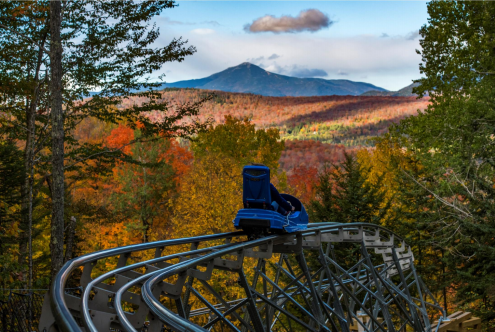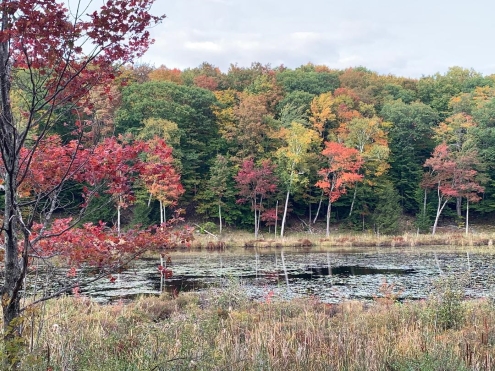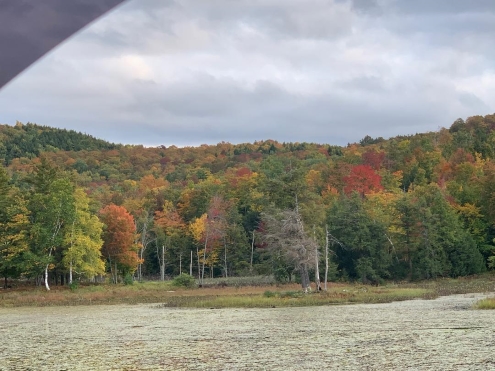Town of Bolton
Warren County
Wilderness Rescue: On Oct. 23 at 11:30 a.m., DEC’s Ray Brook Dispatch received a request for assistance for a 40-year-old woman from Schenectady who became disoriented while hiking Cat Mountain. Coordinates provided by Warren County 911 placed her in the area of Edgecomb Pond. Forest Ranger Lt. Ganswindt responded to assist, arrived on scene at 12 p.m., and headed in on the trail. Using the coordinates provided, Lt. Ganswindt located the hiker at 12:40 p.m., and escorted her back to the trailhead. The incident concluded at 1:10 p.m.
Grand Opening of Cliffside Coaster at Lake Placid’s Olympic Sports Complex

A view from the new Cliffside Mountain Coaster in Lake Placid.
October 11th marked the grand opening of the new Cliffside Mountain Coaster at Mt. Van Hoevenberg in Lake Placid. The longest of its kind in the United States, the mountain coaster travels alongside the 1980 Olympic bobsled track and is the latest year-round attraction at the Lake Placid Olympic Sites.
“The Cliffside Coaster is one of our latest and most thrilling additions to the Olympic Regional Development Authority venues, and part of our ongoing effort to modernize the entire Mt. Van Hoevenberg complex,” Governor Cuomo said. “This revitalization is transforming the complex into a year-round provider of excitement and entertainment for both athletes and families, which will attract more summer visitors and provide a critical boost to local businesses as we work to build back better.”
Opening for its first ride on Sunday, October 11, the mountain coaster is equipped with a timing and audio system that allow visitors to experience the thrill of what it was like to be an Olympic Bobsledder during the 1980 Olympic Winter Games in Lake Placid. The coaster will be open to the public on weekends only, and includes informative and exciting commentary for riders as they glide through twists and turns that replicate the historic track.
ORDA President & CEO, Mike Pratt said, “The Cliffside Coaster is a one-of-a-kind attraction at the newly transformed Mt. Van Hoevenberg. We are incredibly excited to give our guests this exhilarating experience. The coaster follows the alignment of the 1932 & 1980 Olympic Bobsled track as it descends the mountain. The views are amazing, and the curves get your heart pounding. Everyone will feel like they deserve a medal.”
DEC Advises Public to Be Alert for Moose in the Adirondacks
Motorists should be alert for moose on roadways in the Adirondacks and surrounding areas at this time of year during peak moose activity, advises the New York State Department of Environmental Conservation (DEC).
Early fall is the breeding season for moose in northern New York. During this time moose are wandering looking for mates, leading them to areas where they are not typically seen. While this improves the opportunities for people to enjoy sighting of a moose, it also increases the danger of colliding with one on the roadway.
Moose are much larger and taller than deer. Their large body causes greater damage, and, when struck, their height often causes them to impact the windshield of a car or pickup truck, not just the front of the vehicle. New York has no recorded human fatalities resulting from a crash with a moose.
Moose are most active at dawn and dusk, which are times of poor visibility. Moose are especially difficult to see at night because of their dark brown to black coloring and their height – which puts their head and much of their body above vehicle headlights.
Leaves Begin to Change Colors
DEC Announces Sentencing of Saranac Man for Illegal Taking of Moose
The New York State Department of Environmental Conservation (DEC) today announced the sentencing of a Saranac man for illegally poaching a moose in October 2019. On Sept. 3, 2020, DEC’s Division of Law Enforcement investigation into the moose poaching concluded when Zachary Vaughan, 26, of Saranac, New York, was sentenced in the Town of Franklin Criminal Court to 60 days in county jail and $5,525 in fines and surcharges. DEC also revoked Vaughan’s hunting privileges for five years.
DEC’s investigation began on Oct. 31, 2019, when ECO Favreau received a call from a camp member in the Chateaugay Highlands Easement reporting a dead cow moose on the property. The moose was transported to DEC’s Delmar Wildlife Resource Lab for a necropsy. The crime scene investigation continued with the aid of DEC K9 Diesel. Following a series of anonymous calls and an anonymous tip reported to the DEC Environmental Crime Tip-Line, Zachary Vaughan was identified as the shooter.
While Vaughan initially denied the claims, ECOs obtained a supporting deposition. A search warrant was executed on Nov. 26, 2019, by DEC’s Division of Law Enforcement at the home of Vaughan and his parents, during which officers obtained a voluntary statement from Vaughan regarding the poaching incident. On Dec. 4, 2019, Vaughan was charged with four misdemeanors: taking of a moose; possessing a loaded firearm in a vehicle; use of an artificial light in a vehicle while in possession of firearm; and hunting deer with the aid of an artificial light. He also was charged with three additional Environmental Conservation Law violations.
The moose, a protected mammal in New York State, is the largest member of the deer family and the largest land mammal in New York. Hunting moose in New York State is illegal.
Fire Destroys Popular Restaurant in Bolton Landing

A popular Bolton restaurant burned to the ground on Thursday, September 17th.
Many people from Huletts travel to Bolton Landing by boat to stop at local restaurants. One popular one, the Lakeside Lodge & Grille, located right in the heart of Bolton, burned early on Thursday morning, September 17th. Located next to the Bolton Chamber of Commerce on Lake Shore Drive and a short walk up through Rogers park, many people from Huletts are familiar with the Lakeside Lodge & Grille.
The above picture was taken Thursday morning with the fire department still on the scene. It was taken from across the street facing the restaurant and toward Lake George. The Chamber of Commerce and Rogers park would be on the right.
A report from Channel 13
13
Visit to Lapland Pond Includes Plethora of Species
A visit to Lapland pond starts at the Blake Mountain trail head on Pike Brook road.
When you arrive at the Blake Mountain trail head on Pike Brook road, there is actually another destination that you can hike to in addition to going up Black Mountain. That “other” hike is a shorter walk up to Lapland pond. The flora and fauna is quite beautiful and if you walk slowly and take it all in – it is a joy to behold.
The flower of Jewelweed is a natural remedy to poison ivy.
Looking something like a “Tribble” from Star Trek, light green Pincushion moss grows on the side of the trail.
White BaneBerry, is also called “Dolls Eyes,” for its distinctive appearance.
A grove of hemlock trees stands tall.

Watch out for snakes. Here a garter snake slithers along the side of the path.
A tadpole swims quietly in the water.
A beautiful walk in the woods refreshes the soul.
Click all images to see larger versions.
State Senate Approves Adirondack ‘Road Salt ’ Study
Senator Betty Little welcomes county and town highway superintendents in her Albany office on their annual “Local Roads Matter!” Advocacy Day. Little, who is retiring from the Senate at the end of the year, was presented a personalized work helmet in recognition of her years of support for increased funding for local roads and bridge projects.
The State Senate today gave final legislative approval of legislation to create a task force and pilot-program study with the goal of reducing the amount of road salt applied to state highways in the Adirondack Park each winter.
Senator Betty Little and Western New York Senator Tim Kennedy, who chairs the Senate Transportation Committee, sponsored the legislation, which passed the Assembly on Monday.
“When it comes to keeping our lakes, rivers and streams and water wells clean, the old adage of an ‘ounce of prevention being worth a pound of cure’ certainly fits,” said Little.
“The good news, as we’ve seen in municipalities such as Lake George where there has been a tremendous focus on this issue, is that newer equipment and utilizing technology is helping our local highway departments do their incredibly important work of keeping our roadways safe while cutting back on road salt usage. My hope is that we can do the same throughout the Park. A comprehensive study, including a pilot program, would give us the data we need to develop best practices.”
Little said the Adirondack Watershed Institute at Paul Smith’s College has studied the issue for numerous years and found hundreds of instances of high sodium contamination in wells downslope of state highways with some exceeding federal standards for safe drinking. High salinity can contribute to high blood pressure and destroy plumbing and household appliances, pollute streams, rivers and lakes and negatively impact wildlife and soil quality.
The “Randy Preston Road Salt Reduction Act,” named in honor of the long-time Wilmington Supervisor and Adirondack champion who passed away last July, would create a 14-member task force of appointed state and local stakeholders. The task force would conduct a thorough review of road salt application within the Adirondack Park and provide a public report to the governor and State Legislature with recommendations of road salt reduction targets and best management practices by September 1, 2021.
That report would inform the road salt reduction pilot plan and test program to be led by the Department of Transportation in cooperation with the Department of Environmental Conservation. Between October 15 and June 30, beginning 2021 through 2024, the pilot plan would test best management practices on all state-owned roadways within the boundary of the Adirondack Park. A variety of application techniques and road management strategies would be tested while monitoring surface and ground water.
Following the completion of the pilot plan and test, the DOT and DEC would submit a report to the governor and State Legislature by August 30, 2024, detailing the impact on road safety and water quality in the Adirondack Park.
The bill will return to the Assembly before being delivered to Governor Andrew Cuomo for consideration.
Lake George Island Camping Reopens
The DEC continues to announce re-openings of campgrounds in the region. Yesterday, June 19th, the DEC opened Narrow Island, Glen Island and Long Island, to process Island camping reservations.
Look here for the most updated information: https://www.dec.ny.gov/outdoor/7820.html
NYS Coronavirus Update
The number of total COVID hospitalizations continues to decline. Total hospitalizations fell to just over 4600, from 4,844 the day before. The number of new COVID hospitalizations fell to 208, from 225 the day before. Tragically, we lost 84 New Yorkers to the virus Friday.
Please remember that social distancing rules apply at State Parks and all public outdoor spaces. You must wear a mask whenever it’s not possible to maintain six feet of distance from others.
NYS Coronavirus Update
Message from Representative Stefanik on Wednesday’s Capital District Phase 1 Reopening “Brighter days are ahead.”
#NY21 is so eager to get back to work safely. Thank you for everyone’s team effort to get all three of our regions in #NY21 to phase one of NY’s reopening process. There are brighter days ahead! ????? pic.twitter.com/6gQucV0WJK
— Elise Stefanik (@EliseStefanik) May 20, 2020
The number of total COVID hospitalizations continues to decline. Total hospitalizations fell to 5,570, from 5,818 the day before. The number of new COVID hospitalizations fell to 295, from 335 the day before. Tragically, we lost 112 New Yorkers to the virus Tuesday.
Wearing a mask in public makes us all safer.To help get the message across, NY state launched a contest asking New Yorkers to create a video and share in their own words why New Yorkers should wear masks in public. After receiving over 600 great submissions, five finalists have been selected. The winning video will be chosen by an online vote and will be used as a PSA. Watch the videos and vote for your favorite here.
DEC Forest Ranger Rescues Near Lake George
Town of Bolton
Warren County
Wilderness Rescue: On April 29 at 4:30 p.m., Warren County 911 transferred a call to DEC’s Ray Brook Dispatch reporting a 75-year-old man from Gansevoort who became disoriented while hiking on Thomas and Cat mountains and was unsure about which path to take to get back. After obtaining the disoriented hiker’s cell phone number, Forest Ranger Evan Donegan contacted him and gave instructions on how to return to the trailhead on the north side of the mountain. Meanwhile, Ranger Donegan made his way into the woods to intercept the man and assist him the rest of the way out. At 6:28 p.m., Ranger Donegan reached the mountain’s summit, but had not found the hiker. Forest Ranger Joe Hess also responded to start in from the southern trailhead at Edgecomb Pond. At 7:09 p.m., the hiker’s daughter called Dispatch reporting her father was back on the trail with her husband. Ranger Donegan was notified and reached the two men by 7:19 p.m. He escorted the pair back to the trailhead and all Rangers were cleared from the scene.
Town of Bolton
Warren County
Wilderness Rescue: On May 2 at 9:29 p.m., DEC’s Ray Brook Dispatch received a call from a concerned family member of two hikers on Cat Mountain. The hikers were not prepared for darkness and were lost on the trail. The caller was instructed to have the hikers call 911 to obtain their coordinates. Dispatch determined that the hikers were just off the east trail. Forest Ranger Evan Donegan responded to the trailhead south of Edgecomb Pond at 10:45 p.m. and started hiking in to locate the hikers. At 11:53 p.m., Ranger Donegan requested a second Ranger to respond to the north trailhead to assist with transportation needs once the hikers were located. At 12:15 a.m., Ranger Donegan advised that the two hikers were found off the trail, tired and slightly hypothermic. Ranger Donegan assisted the pair north up the trail where they were met by Ranger Logan Quinn with an ATV. The 66-year old woman and 67-year-old man from Saratoga Springs were given a ride out to the parking lot. The couple declined medical treatment and departed. All Rangers were cleared from the scene at 2:35 a.m.
DEC Forest Ranger Rescue on Black Mountain
On April 11 at 7:35 p.m., DEC’s Ray Brook Dispatch received a call from a hiker reporting his brother was overdue returning from Black Mountain in Dresden NY. The caller stated that they last saw the 15-year-old male from Hudson Falls on the summit of Black Mountain at 5:30 p.m., when he proceeded down the trail alone. The teen was reported as having only his cell phone and the clothes he was wearing.
Forest Rangers Evan Donegan and Mark St. Claire responded to the location, and at 8:15 p.m., Dispatch established text contact with the hiker and advised him to call 911. Washington County 911 got coordinates from his call, which placed him by a stream off the trail but near a road. Ranger St. Claire proceeded down the road from the trailhead where he was able to see the hiker’s cell phone light. Ranger St. Claire located the hiker, escorted him out of the woods, and gave him a ride back to the trailhead where he was met by his family. All Rangers were cleared from the scene at 9:26 p.m.
Winter from the Top of Black Mountain

Looking north up Lake George from Black Mountain shows the northern end of the lake is still open water. (Click image to see full-scale.)

Looking northwest from the same spot shows the middle of the lake is mostly frozen. The snow covered mountain in the upper left center of the photo is Mt Marcy. The sharp peak in the far distant close to center of the photo is Whiteface. (Click image to see full-scale.)
And clouds of white
The bright blessed day
The dark sacred night
And I think to myself
What a wonderful world”










